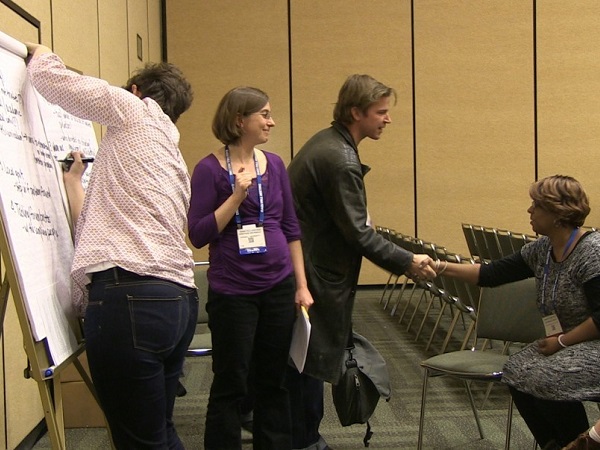Solicita ahora para formar parte de nuestra próxima grupo de Becados en Ciencia científicos comunitarios y líderes comunitarios.

In the last few months, the TNH2H team has presented their project findings at several conferences including University of Colorado-Boulder’s CU Engage program and at the 7th Living Knowledge Conference (LK7) at the Dublin Institute of Technology in Dublin, Ireland (June 2016). Below is their poster for CU Engage and the case study presentation and handout for LK7:
“Investigating Indoor Air Quality Using a Community-based Participatory Research Model”
Case Study: Challenges Beyond Data Analysis
Collier MS, Ashley, George Ware, Patricia G. Iwasaki MSW, LaShonn Billingsley, Michael Hannigan PhD and Deborah S. Main, PhD (December 2016) “Moving from Results to Action for an Indoor Air Quality Pilot Project” Poster presented at the meeting of the American Geophysical Union. San Francisco, CA.
Los barrios son muy diversos en cuanto a raza/etnia e ingresos. Algunos de los barrios pueden describirse como desiertos alimentarios, con un acceso limitado a alimentos sanos y asequibles. La investigación de TNH2H ha contribuido a solucionar este problema, por ejemplo creando huertos urbanos comunitarios y cambiando las políticas municipales para permitir la venta de productos de huertos familiares.
Los participantes de Taking Neighborhood Health to Heart (TNH2H) están interesados en la calidad del aire local y su impacto en la salud; la calidad del agua potable; los niveles potenciales de contaminación del suelo; y la vulnerabilidad de sus barrios de Denver a los riesgos naturales y al cambio medioambiental, especialmente al cambio climático. Al igual que muchas zonas de Colorado y de todo Estados Unidos, los barrios de TNH2H también deben responder a retos relacionados con el clima y la meteorología, como los largos periodos de sequía y, más recientemente, las lluvias extremas(tormenta de otoño de 2013)
Taking Neighborhood Health to Heart (TNH2H) is a community-based participatory research project which began in 2006 and involves: five diverse urban Denver neighborhoods: Park Hill, Northeast Park Hill, East Montclair, Northwest Aurora and Stapleton; the University of Colorado Denver; and, the Stapleton Foundation. TNH2H residents are curious about the potential to detect any residual influence on air quality from historical activities in their formerly industrial neighborhood.
Actualmente TNH2H busca financiación adicional. Si tienes algún contacto o recurso de financiación que quieras compartir, envíanos un correo electrónico.

The Taking Neighborhood Health to Heart (TNH2H) team has made significant progress in the past several months. They have completed their data collection and now have radon and PERC (two volatile organic compounds) data for 15 homes in their study area. Their experiment used both high quality and low-cost methods so that they might compare the results of the two. The team kept the community involved, as they shared their newly acquired data with all participants of the study. They took the time to meet one-on-one with participants and answer any questions they had regarding results and recommended actions. The team plans to share results from their dosimeter tube experiments (the low-cost method) on Experiment.com’s journal site as soon as possible, so stay tuned!

Patricia Iwasaki, MSW, is a Taking Neighborhood Health to Heart Board Member. She has also served as Co-Chair of their Data Review and Dissemination Committee since 2010. She sits also on a food policy council appointed by the Mayor and two other food-focused boards. Her passion is health equity for low income and communities of color and community-based participatory research (CBPR). She has almost a decade graduate-level teaching experience, specializing in community practice, healthcare interventions and policy, and social work with chronically and terminally ill.
George Ware, MS, is President of the Board of Directors of Taking Neighborhood Health to Heart, Inc. Before retiring from the Colorado Department of Public Health and Environment, he supervised the STI/HIV Section’s Research and Evaluation Unit. With his involvement in Taking Neighborhood Health to Heart, he has focused his energies on supporting neighborhood residents in creating healthy communities through their participation in community-based participatory research initiatives.
Ashley Collier is an Environmental Engineering PhD student at the University of Colorado, Boulder. She works with an air quality research team on low-cost sensor quantification and exploring applications of next-generation monitoring technologies. She is interested in the potential these technologies have to further research, education, and citizen science.
(c) 2024 Thriving Earth Exchange